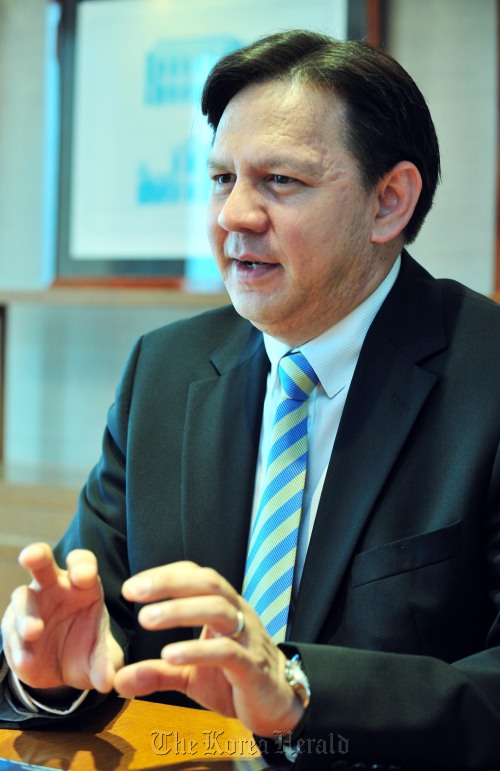[Herald interview] Universal Music sees big potential in Korean classical music
By 김윤미Published : April 8, 2011 - 19:52
Universal Music Group International, which has prestigious label Deutsche Grammophon, expects that the Korean demand for classical music to grow faster in the coming years on the back of the country’s growing wealth and interest in the genre.
“The first thing you need to invest in classical music is a market that is confident of growth. The second thing is an extremely accelerating level of wealth in the market,” said Sandy Monteiro, president of South East Asia of Universal Music Group International, in an interview with The Korea Herald
“When this happens, there is a growth in aspiration for more sophisticated aspects of life. Classical music has always been something that people aspire to when they feel they’ve achieved a certain status in life.”
Korea is one of the Asian markets seeing rapid growth in interests in classical music.
Korea has had a history of being a key classical market for Universal Music and appreciation for classical music by society at large, Monteiro said.
In Korea, there is also a high level of learning classical music at a very young age, which pushed up the country’s average musical instrumental skills higher than those in other countries, he said.
“The first thing you need to invest in classical music is a market that is confident of growth. The second thing is an extremely accelerating level of wealth in the market,” said Sandy Monteiro, president of South East Asia of Universal Music Group International, in an interview with The Korea Herald
“When this happens, there is a growth in aspiration for more sophisticated aspects of life. Classical music has always been something that people aspire to when they feel they’ve achieved a certain status in life.”
Korea is one of the Asian markets seeing rapid growth in interests in classical music.
Korea has had a history of being a key classical market for Universal Music and appreciation for classical music by society at large, Monteiro said.
In Korea, there is also a high level of learning classical music at a very young age, which pushed up the country’s average musical instrumental skills higher than those in other countries, he said.

“In my Korean team, everybody did some music lessons and they pushed themselves up to reach a certain level of achievement to play classical music, which is very rare,” he said.
The rich pool of talents in the country, based on eagerness for classical music education, will prompt the music distributor to search for more artist signings and investment in classical acts, Monteiro said.
While Universal Music’s classical music market share is about 50 percent in Korea, the company aims to grow 5 percent year-on-year basis, according to Pete Song, director of classics & jazz at Universal Music Korea.
Meanwhile, not only Korean classical music but K-pop will grow tremendously in the global market, he said.
Universal Music, which claims that it is the largest distributor of K-pop, distributes albums of big name Korean pop idol groups such as Girls’ Generation, BEAST, 4 Minute, Wonder Girls, KARA, Big Bang and 2AM.
“I’m more impressed by the development process of Korean artists (than the artists themselves) … When I first met BEAST, they were just a bunch of boys but I could see them change from boys to stars in front of my eyes,” Monteiro said.
He was especially surprised when he visited a Korean entertainment agency where several aspiring pop stars danced for six hours non-stop every day. “That doesn’t happen anywhere else in the world,” he said.
By Kim Yoon-mi (yoonmi@heraldcorp.com)








![[Kim Seong-kon] Democracy and the future of South Korea](http://res.heraldm.com/phpwas/restmb_idxmake.php?idx=644&simg=/content/image/2024/04/16/20240416050802_0.jpg&u=)









![[Today’s K-pop] Zico drops snippet of collaboration with Jennie](http://res.heraldm.com/phpwas/restmb_idxmake.php?idx=642&simg=/content/image/2024/04/18/20240418050702_0.jpg&u=)